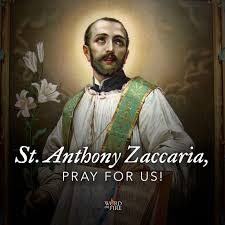WEEK 13 05 HOMILY – Year II
Forgiven, Healed, Merciful:
Optional Memorial of St. Anthony Zaccaria
(Amos 8:4-6, 9-12; Ps 119; Mt 9:9-13)
**********************************************
“No one lives by bread alone, but by every word that comes from the mouth of God” and “I desire mercy, not sacrifice.”
These two sentences from the readings today frame a powerful message for us centred on Matthew: Listen to the Word, repent, heal and be merciful.
That was Matthew’s experience. A tax collector, his job was to collude with the Roman occupiers of his land, collect taxes from the people, add his commission to the amount (the Roman governor probably didn’t care how much or how unjust that amount might be), keep what was his and turn the rest over to the government. It was a system ripe for abuse and corruption, and Matthew was implicit in that system.
Then his life changed. Matthew heard Jesus call his name and the invitation to follow him. For some reason, that call penetrated Matthew’s hardened shell. I believe it was the shock of being accepted as he was, and forgiven all the sins he had committed, conveyed to him by the voice of Jesus that day. This should not surprise us, as being forgiven seems to be the preferred criteria God uses in choosing spiritual leaders – from Moses to David in the Old Testament, to Peter and Paul, and for that matter, all the apostles in the New.
The next effect was transformation, healing, a change of life. Certainly, Matthew left all his devious, crooked ways behind, was healed of his greed and selfishness, and became a follower of Jesus. What we can be very grateful about is that his experience of mercy from Jesus led him to be merciful in turn. It is Matthew who more than any other author in the New Testament teaches the importance of both forgiving and apologizing, of being merciful and opening ourselves up to receiving mercy from others.
In Matthew 18:15-23, he has Jesus teaching us how to forgive as well as how often to forgive and be merciful, and in Matthew 5:23, he has Jesus teaching us the importance of being reconciled with others, even leaving worship to seek reconciliation when we realize someone may have a grudge against us.
With the statement desiring mercy more than sacrifice, certainly Jesus is much more interested in our attempts at reconciliation wherever it is needed, than in any number of prayers or amount of fasting or other sacrifices we might make trying to please him.
The comment Jesus came for the sick, not the righteous, brings to mind the parables of the lost sheep and lost coin. The gist of those parables is not the value of what was lost – it is that the sum was incomplete – in both cases one was missing. A comparison might be a mother at a family gathering when one of the children is not present. Until that child shows up or at least calls, she cannot rest because the family is incomplete, and that connection alone is what will satisfy her. Matthew was a lost child, and Jesus reached out to him to bring him back into the fold.
Regarding both those parables, we might get the idea God loves sinners more than the righteous. A second point of these parables is there are no righteous persons – the sheep without a shepherd are just as lost as the one who went astray. We are all sinners in need of redemption, of forgiveness and healing, like Matthew, and God loves us all equally.
The first reading in its own particular way underlines the importance of listening to and living the Word of God. The prophet Amos continues to berate his fellow Israelites for their infidelity and ignoring the Word of God – the commandments of the Covenant or Law they were given by Moses – which is what Matthew was all about as well. Amos has an interesting way of portraying the consequences of that infidelity, as a drought not of water, but of the Word of God. It is as if they had no use for the Word, so the Word will now be of no use to them – they won’t even be able to find it!
The psalm response underlines the importance of being attentive to God’s Word: “No one lives by bread alone, but on every word that comes from the mouth of God.” This psalm (119) contains within every stanza, one or more references to the law or Word of God, except for one (as nothing is perfect in this life). The three verses today mention decrees, commands, ordinances and precepts.
 Today we honour St. Anthony Zaccaria, who was born in Cremona, Italy, in 1502. Both a physician and priest, he was greatly inspired by St. Paul. Anthony was the founder of the Clerks Regular of Saint Paul (known as the Barnabites with their headquarters at the church of St Barnabas in Milan). He encouraged the laity to work with the clergy in helping the poor and promoted frequent reception of communion. Anthony died in 1539 at age 37 and was canonized in 1897.
Today we honour St. Anthony Zaccaria, who was born in Cremona, Italy, in 1502. Both a physician and priest, he was greatly inspired by St. Paul. Anthony was the founder of the Clerks Regular of Saint Paul (known as the Barnabites with their headquarters at the church of St Barnabas in Milan). He encouraged the laity to work with the clergy in helping the poor and promoted frequent reception of communion. Anthony died in 1539 at age 37 and was canonized in 1897.
The Eucharist brings into play all the elements of these readings – Word, forgiveness, transformation and mercy. We ponder the Word of God, experience God’s mercy as forgiveness and healing, and are missioned to go out and be merciful in turn, like Matthew.



